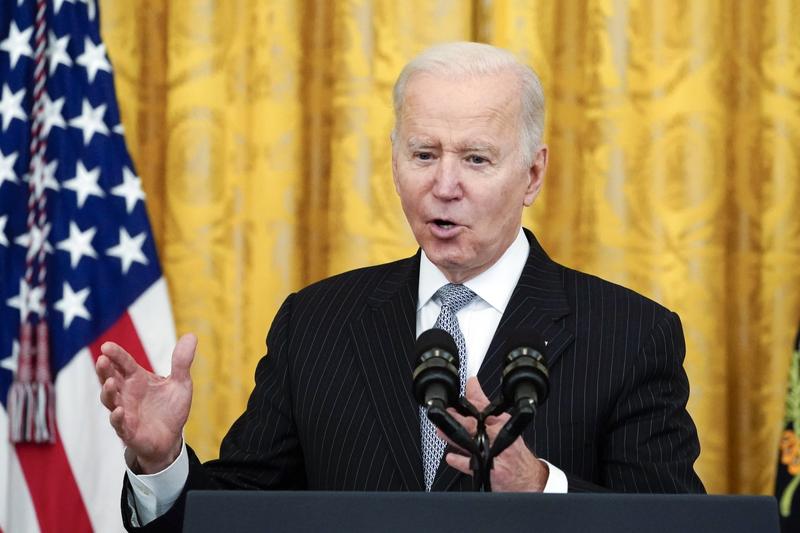 Pentagon spokesman John Kirby speaks during a briefing at the Pentagon in Washington, Feb 2, 2022. President Joe Biden is sending about 2,000 troops from Fort Bragg, N.C., to Poland and Germany this week and sending part of an infantry Stryker squadron of roughly 1,000 troops based in Germany to Romania. (ANDREW HARNIK / AP)
Pentagon spokesman John Kirby speaks during a briefing at the Pentagon in Washington, Feb 2, 2022. President Joe Biden is sending about 2,000 troops from Fort Bragg, N.C., to Poland and Germany this week and sending part of an infantry Stryker squadron of roughly 1,000 troops based in Germany to Romania. (ANDREW HARNIK / AP)
WASHINGTON/MOSCOW – The United States will deploy additional troops to Europe, the Defense Department announced Wednesday, citing tensions on Ukraine's borders.
The deployment includes 1,000 troops currently based in Germany to be repositioned to Romania and another 2,000 troops to be sent from the US to Germany and Poland, John Kirby, the Defense Department's spokesman, said during a press conference at the Pentagon.
ALSO READ: No intention of putting US or NATO troops in Ukraine, says Biden
These movements are unmistakable signals to the world that we stand ready to reassure our (North Atlantic Treaty Organization) allies and deter and defend against any aggression.
John Kirby, Spokesman, US Defense Department
"These are not permanent moves. They are moves designed to respond to the current security environment. Moreover, these forces are not going to fight in Ukraine," Kirby said.
"These movements are unmistakable signals to the world that we stand ready to reassure our (North Atlantic Treaty Organization - NATO) allies and deter and defend against any aggression," he added.
The US has already put some 8,500 troops on "heightened alert," in preparation for what it claimed to be an "imminent" Russian invasion of Ukraine. The measure will enable the troops to be deployed on short notice if NATO decides to activate its rapid response force known as the NRF.
Kirby said the troops being deployed are separate from those put on high alert. They will operate on a bilateral basis with their host countries, and will be under US command – not NATO command – since the alliance has yet to activate the NRF.
READ MORE: Chinese envoy calls for quiet diplomacy on Ukraine
 President Joe Biden speaks during a "Cancer Moonshot," event in the East Room of the White House, Feb 2, 2022, in Washington. (ALEX BRANDON / AP)
President Joe Biden speaks during a "Cancer Moonshot," event in the East Room of the White House, Feb 2, 2022, in Washington. (ALEX BRANDON / AP)
Repeatedly declining to say whether the deployment was in response to fears that Russia could attack a NATO country, the spokesman said the US troops could be augmented by additional deployments in the coming days or months, noting that other NATO countries – including Britain, France and Denmark – have also moved to shore up the alliance's eastern flank.
President Joe Biden said Friday he "will be moving US troops to Eastern Europe and the NATO countries in the near term." The president has maintained that no US forces will be sent directly to Ukraine, which is not a NATO member.
PUTIN TALKS WITH JOHNSON
President Putin discussed the Ukrainian crisis and Moscow's security proposals with British Prime Minister Boris Johnson in a telephone conversation Wednesday.
The two leaders exchanged views on the situation in Ukraine, with Putin drawing attention to Kiev's non-compliance with the 2015 Minsk accords, the Kremlin said.
Putin pointed to NATO’s "unwillingness" to formulate an adequate response to Russia's security proposals, adding that the alliance was "hiding behind" its commitment to the "open door policy," which contradicted the principle of indivisible security.
According to a statement published on the British government's website, the leaders agreed that an escalation of the situation was "in no one's interest."
The prime minister stressed the importance of dialogue and diplomacy, and the need to include Ukraine in talks, the statement said.
Johnson met with Ukrainian President Volodymyr Zelensky in Kiev on Tuesday, where the two discussed security issues, and in particular Russia's military buildup on the Ukrainian border.
Since November, Kiev and its Western allies have accused Russia of amassing troops near the Ukrainian border, further pointing to the possibility of an "invasion."
Moscow has denied such claims, adding that it had every right to mobilize troops within its borders and defend its national security.


